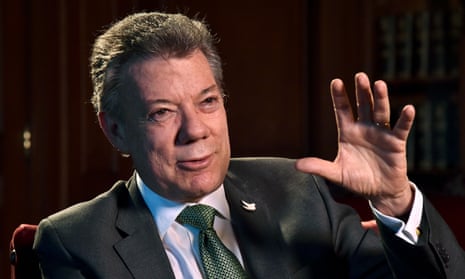Colombia’s president, Juan Manuel Santos, has said it is “insane” to keep approaching the global narcotics problem with the same failed policies of the past and called on drug war hawks to understand that “the old way of doing things is the wrong way”.
Speaking after a United Nations policy summit voted to maintain its support for prohibitionist drug policies, Santos told the Guardian: “Let me be clear with them: the prohibitionist approach has been a failure.”
“It’s time to leave ideologies behind and embrace the evidence. And the evidence points to the need for new policies,” he said in an interview. “If something is not working for more than 40 years, logic and common sense tell you that it must be changed or it must be.”
Speaking ahead of his address on Thursday, to the special session on the UN general assembly, Santos said that the “outcome document” adopted on Tuesday was a far cry from the progressive agenda that had spurred Colombia, Mexico and Guatemala to press for the world meeting.
As the world’s largest single supplier of cocaine, Colombia has spent decades fighting powerful drug cartels that nearly brought the nation to its knees, and attempting to stop farmers producing coca leaf which provides the raw material for the drug trade.
Mexico has also been devastated by drug war violence, while Guatemala has also seen its institutions undermined by mafia-fuelled corruption.
And despite millions of dollars spent on military and judicial efforts to crack down on narcotics, the business continues to thrive. “It’s insane to continue down the same path expecting a different result,” Santos said.
Colombia, Mexico and Guatemala lobbied to hold the 2016 general assembly special session – known as Ungass to seek a more “humane solution” to the drugs problem that goes beyond a focus on enforcement and criminalisation.
Colombia had hoped the UN members could agree to incorporate a human rights perspective to the drugs problem to prevent stigmatisation of drug users, abolish the death penalty for drug-related offences and make treatments for drug abusers mandatory. “A purely repressive approach is counterproductive and cruel,” Santos said.
In the end, the summit declaration called for greater cooperation between nations, but maintained the prohibitionist framework which criminalises all drug use that is not for medical or scientific purposes, and included no criticism of the death penalty for drug crimes.
The Colombian president said the most important gain achieved in the document is an acceptance of flexibility in interpreting the UN conventions on drugs so that each country can “implement national policies according to local circumstances and challenges”.
“It’s a step in the right direction, but it’s certainly not enough,” Santos said.
The Colombian leader said the world needs all countries to be on board with the same approach to have an impact. “You can have a regional approach but that does not work as effectively because this is a transnational problem, and it needs the whole world to have some common denominators for the drug lords and mafias not to take advantage of these differences,” he said.
At the last UN special session on drugs, in 1998, international leaders agreed to work toward a “drug-free world” by 2008. Today that ideal has given way to liberalisation of drug laws, especially around marijuana.
But drug decriminalisation or legalisation is only viable if there is a global consensus, according to the Colombian president. “We are still very far from that,” Santos said.
Colombia sees the assembly as a beginning, rather than an end. “I would hope that the more we analyse the situation and that the world sees experiments working they will realise that the old way of doing things is the wrong way,” Santos said.
“The work starts now, but the transformation will require a decade or longer,” he said.

Comments (…)
Sign in or create your Guardian account to join the discussion